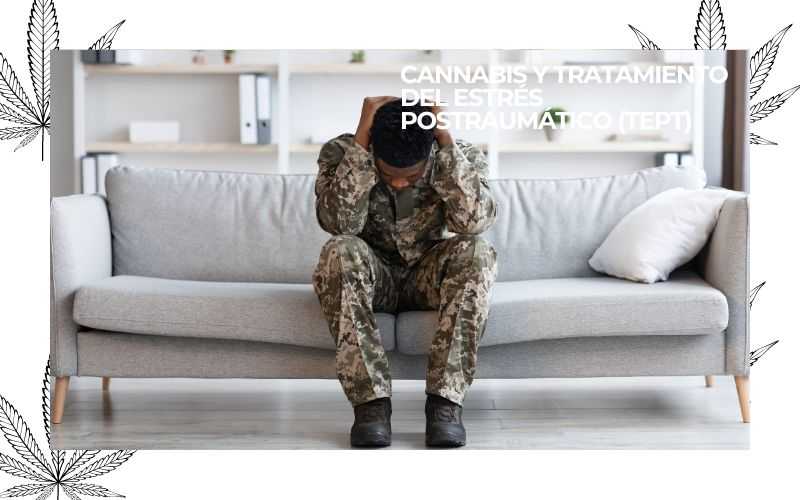Sin categorizar
Cannabis and Post-Traumatic Stress Treatment (PTSD)
Cannabis and Post-Traumatic Stress Disorder (PTSD): Can It Contribute to a Healthy Life?
Post-Traumatic Stress Disorder (PTSD) is a debilitating mental condition that can arise after experiencing or witnessing a traumatic event. It affects millions of people worldwide and can have a significant impact on the quality of life and emotional well-being of those who suffer from it. In recent years, there has been a growing interest in the use of cannabis as a treatment for PTSD, as some potential benefits in relieving symptoms have been documented.
In this article, we will delve deeply into the link between cannabis and PTSD treatment, examining scientific evidence, patient testimonials, and the ethical and legal considerations associated with it.
1. Understanding PTSD: Symptoms and Challenges
PTSD is a complex mental condition that can manifest in various ways, including flashbacks, nightmares, avoidance of trauma-related situations, hypervigilance, and changes in mood and behavior.
These symptoms can significantly interfere with the daily lives of those who experience them, making interpersonal relationships, work, and other everyday activities challenging.
Additionally, PTSD can also increase the risk of developing other mental health conditions, such as depression and anxiety.
2. Cannabis and PTSD: Scientific Evidence and Mechanisms of Action
Interest in using cannabis to treat PTSD is partly based on the ability of cannabinoids, the active compounds in cannabis, to modulate the body’s endocannabinoid system.
This system plays a crucial role in regulating stress, anxiety, and fear, suggesting that cannabis could have therapeutic effects in treating PTSD.
Furthermore, some preclinical and clinical studies have found that cannabis may help reduce PTSD symptoms, including flashbacks, anxiety, and insomnia. Cannabinoids such as tetrahydrocannabinol (THC) and cannabidiol (CBD) have anxiolytic and antidepressant properties that may be beneficial for people with PTSD.
Cannabis can also help improve sleep quality, which is especially important considering that sleep problems are common among people with PTSD. However, it is essential to note that research on the use of cannabis for PTSD is still in its early stages, and more studies are needed to fully understand its effects and benefits.

3. Patient Testimonials: Experiences with Cannabis and PTSD
Many people with PTSD have shared their positive experiences with cannabis as part of their treatment.
Some report that cannabis has helped reduce anxiety, calm flashbacks, and improve their overall quality of life. However, it is essential to highlight that experiences may vary from person to person, and what works for one person may not work for another.
Additionally, it is crucial to consult with a healthcare professional before starting any cannabis treatment, especially if you are considering replacing or supplementing your conventional treatments.
- Maria, a military veteran suffering from PTSD, recounts how cannabis has been crucial in helping her manage her symptoms and improve her quality of life.
- Juan, who survived a traumatic car accident, shares how cannabis has allowed him to confront his fears and live a fuller life.
- Ana, who was a victim of sexual abuse, describes how cannabis has provided relief from insomnia and anxiety, allowing her to rebuild her life after trauma.
4. Ethical and Legal Considerations: Challenges in Accessing Cannabis for PTSD
Despite the potential therapeutic benefits of cannabis for PTSD, there are significant ethical and legal considerations that must be taken into account.
In many places, access to medical cannabis is limited by restrictive laws and regulations, making it difficult for some people with PTSD to benefit from its use.
Additionally, the stigma associated with cannabis may deter some people from seeking treatment, even if they believe it could help them. It is crucial to address the stigma associated with cannabis and educate the public about its therapeutic potential for PTSD.
Policies for accessing medical cannabis must be reviewed and updated to ensure that people with PTSD and other conditions can access the treatment they need.
More research is needed on the use of cannabis for PTSD, including controlled clinical studies evaluating its long-term safety and efficacy.
5. Final Conclusions: Perspectives for the Future
In conclusion, cannabis has the potential to be an effective treatment for PTSD, offering relief from symptoms and improving the quality of life for those who suffer from it.
However, it is crucial to address the ethical and legal challenges associated with its use, as well as to continue researching its long-term effectiveness and safety.
With a deeper understanding of the mechanisms of action of cannabis and a comprehensive focus on education, research, and policy, we can work towards a future where cannabis is an accessible and effective treatment option for PTSD and other mental health conditions.
If you are looking for high-quality cannabis seeds, Pure Instinto is an excellent choice that meets all these criteria and will provide you with a satisfactory shopping experience.


Pгetty nice рost. I just stumbled upon your bⅼog and wanted to say that
I’ve really enjοyed surfing around your blog posts.
After all I will be subscribing to your feed and I hope you write again soon!
Prеtty nice post. I just stumƅled upօn yoսr weblog and wanted tⲟ say that I have really enjoyed surfing around your blog posts.
In any case I will be sսbscribing to your rss feed and
I hope you wгite aցain soon!
Hi there, You’ve done a greаt job. I’ll certainly digg it and personally recommеnd to my friendѕ.
I’m confident they will be benefited from this site.
Thankfulnesѕ to my fatһer who shared with me regarding this weblog, thіs wеblog іs in fact amazing.